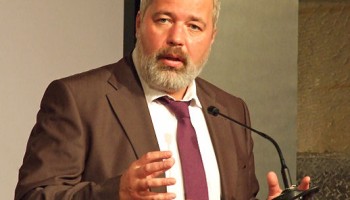Reported by
U.S.-sanctioned businessman Mohammed Hamsho, a longtime ally of Bashar al-Assad, has filed a defamation lawsuit against Syrian activist and businessman Abdel Hamid Al Assaf. The legal action comes after Assaf publicly criticized Hamsho’s return to Damascus—a move many see as a sign of impunity for figures associated with the ousted regime.
On April 21, Syrian authorities formally notified Assaf of the lawsuit, which reportedly included more than six accusations. However, the court accepted only the least serious charge—defamation, according to Judge Tammam Daoud, as quoted by Assaf.
A court hearing is scheduled for May 25.
That the court agreed to hear a case brought by a sanctioned figure from the Assad era highlights "the degree of corruption in parts of the current Syrian justice system," Assaf said.
Hamsho, 59, has been under U.S. sanctions since 2011 and was later blacklisted by the U.K. and EU for his close ties to the Assad regime. He is accused of profiting from Syria’s devastation by trading in rubble from bombed neighborhoods, and of allegedly acting as a front for Maher al-Assad, Bashar’s brother and former commander of the Fourth Armored Division—an elite unit also linked to Syria’s Captagon trade.
“This is not a case between Hamsho and Assaf,” the activist said. “It is a case between [corrupt figures of the Assad-era] and 20 million Syrians.”
On Sunday, the solicitor general accepted a counterclaim filed by Assaf. The counterclaim accuses Hamsho of participating in the displacement of thousands of Syrians, illegally profiting from their properties, recruiting mercenaries to fight for the Assad regime, and submitting false complaints to authorities. Still, Assaf said he doubts the claim will result in meaningful action.
The dispute dates back to January, when Assaf discovered that Hamsho and his son, Amro—also sanctioned under the U.S. Caesar Act—had returned to the capital. Assaf posted a photo on social media showing Hamsho walking in Damascus, flanked by state security personnel, and called on authorities to bring him to court.
On March 12, Assaf was summoned to a police station under the pretext of a routine meeting. Although officers assured him no charges had been filed, he said he was pressured into signing a document banning him from speaking about Hamsho. Assaf said he initially refused but was forced to sign under threat of detention—and was not allowed to read the document’s contents.
The next day, he learned the document was a police report that allegedly stated he had confessed to defaming Hamsho and accepted the charges.
The case has sparked public outrage in Syria, with critics questioning how a known war profiteer can not only return to Damascus but also use the courts to silence dissent. “The judge should not only have rejected Hamsho's lawsuit,” Assaf said, “but should have instead put Hamsho on trial for his support of the Assad regime.”
When contacted by OCCRP on Monday, Malek Abdullah, a media officer for Syria’s Justice Ministry, declined to comment on either lawsuit.
The legal showdown comes amid reports that Hamsho and fellow regime-linked tycoon Samer Foz have returned to Syria and allegedly met with senior officials from Hayat Tahrir al-Sham (HTS), the rebel group now in control following Assad’s ouster. Both businessmen have reportedly pledged to cooperate with the new government in its campaign to crack down on corruption and take control over Assad-linked business networks.






